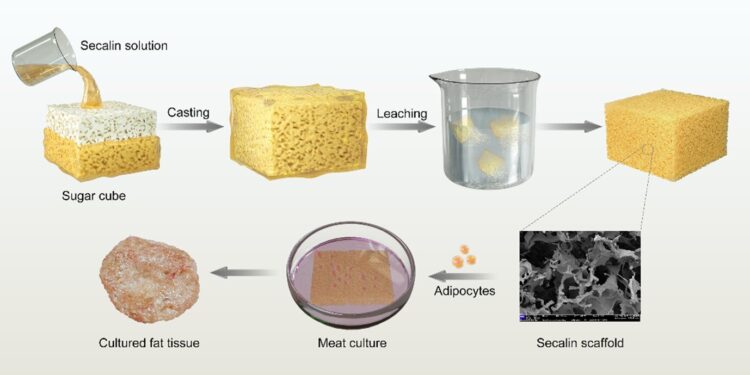Schematic illustration of cultured porcine adipose tissue based on sponge-like secalin scaffolds created using the model leaching method. This process uses sugar cubes and grain proteins to produce high-porosity scaffolds, with interconnected pores and adjustable resistance, making them ideal for growing cultured adipose tissue. Credit: Journal of Agricultural and Food Chemistry
Food scientists at the National University of Singapore (NUS) have developed a simple and scalable method to cultivate pig adipose tissue using protein scaffolds based on secalin, a protein extracted from rye.
Cellular agriculture offers a sustainable alternative to conventional meat production but faces significant technological challenges. One of the major technical bottlenecks for large-scale commercialization of cultured meat is the lack of edible and functional scaffolds that meet scalability, cost, and safety requirements.
A research team led by Professor Huang Dejian from the NUS Department of Food Science and Technology has found that rye secalin, an abundant plant protein, is suitable for edible scaffolding materials. They invented a template leaching method to make scaffolding from secalin. This process is completely food grade, cost effective and sustainable, producing secalin scaffolds with high porosity and mechanical stiffness ideal for pig fat cell growth.
The research results were published in the Journal of Agricultural and Food Chemistry.
This patent-pending technology overcomes scaffold manufacturing bottlenecks in terms of cost, functionality and scalability. The discovery presents a new direction for the cellular agriculture sector.
In this work, common sugar cubes were used as highly permeable templates to prepare sponge-like sugar scaffolds. These protein scaffolds exhibited high porosity of approximately 90%, high water stability, and optimal mechanical properties (below 3 kPa) for adipose tissue culture.
Adipose tissue is an essential component of meat that contributes to the juiciness, texture and nutritional values specific to meat. After 12 days of porcine adipose cell culture, the resulting pork adipose tissue closely resembled conventional pork subcutaneous adipose tissue in appearance, texture, flavor, and fatty acid profiles.
By customizing larger sugar cubes, large-scale manufacturing of Secalin scaffolding can be achieved. Additionally, the research team is exploring a differentiation medium containing effective food-grade ingredients to control the fatty acid composition and improve the nutritional value of cultured pork fat.
Professor Huang said: “Cereal prolamins are promising natural sources for scaffold development, and they can be recovered from locally generated spent grains such as barley grains. Our simple, green method using sugar cubes as templates should facilitate large-scale production of edible scaffolds. for cultured meat while contributing to the local sustainable and circular economy.
More information:
Lingshan Su et al, Rye Secalin 3D Porous Edible Scaffolds for Cell-Based Pig Adipose Tissue Culture, Journal of Agricultural and Food Chemistry (2024). DOI: 10.1021/acs.jafc.3c09713
Provided by the National University of Singapore
Quote: Cellular agriculture research succeeds in growing pig fat tissue on rye protein scaffolds (October 3, 2024) retrieved October 3, 2024 from
This document is subject to copyright. Except for fair use for private study or research purposes, no part may be reproduced without written permission. The content is provided for informational purposes only.



